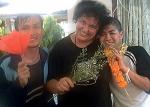Khmer Rouge Trials
Ever since visiting the killing fields in Cambodia in 2002, (for pictures click on the category for Cambodia on the right-hand side of the screen) I have watched closely the development of an international tribunal that hopefully will try the remaining Khmer Rouge killers of as many as 1.7 million Cambodians from 1975 to 1979. Anyone who was educated…even wore eyeglasses…was targeted in the interest of blasting Cambodia back to the stone age and creating an agrarian society, leaving Cambodia one of the most destitute and corrupted countries in the world today. So much for ideas. Pol Pot, the Khmer Rouge’s despotic leader, died a free man in 1998. Many of the remaining Khmer Rouge leaders, including Nuon Chea, Pol Pot’s chief deputy known as “Brother Number Two,” are aged.
According to the Washington Post this morning, “at stake is the chance for a reckoning of a regime that presided over the systematic mass murder of its own people with a fervor still little understood.
Last Friday, a multinational tribunal of Cambodian and United Nations-appointed judges, prosecutors and defenders said it had failed to resolve all of its differences over the adoption of internationally accepted legal procedures for the trials.
Critics say that by rebuffing across-the-board international standards, the Cambodian government is effectively trying to exert political control over the trials in a bid to limit the scope of information that will be publicly aired.
Human rights groups are assailing the Cambodian government for stacking the court with judges who have close ties to the ruling Cambodian People’s Party. In a nation where several current and high-ranking government officials have still-unclear links to the atrocities committed by the Khmer Rouge, critics say the government’s failure to appoint more independent-minded judges has gravely damaged its credibility.
Given the broad corruption in Cambodia’s judicial system, U.N. officials had pressed for a court dominated by international judges. But they ultimately accepted a compromise in which both Cambodian and U.N.-appointed judges would sit on the same tribunal.
Observers say the probes launched by U.N.-appointed investigators may be moving far faster than the Cambodian government had counted on, particularly given that several high-ranking members of the ruling party, including Prime Minister Hun Sen, are former Khmer Rouge members who could be uneasy about such highly public trials. Although the court is likely to indict only a handful of those former Khmer Rouge members most responsible for war crimes, the testimony that could emerge could prove embarrassing for the government. Some have suggested that the Chinese, now the largest source of foreign investment here, have pressured the Cambodians to delay the trials to avoid revealing the extent of Beijing’s long support of the Khmer Rouge.
Joseph A. Mussomeli, the U.S. ambassador to Cambodia added “We want the trial, but the only thing worse than no trial is a trial that is a farce.”
Human rights organizations have argued that even if a high legal bar is adopted, the tribunal has already been compromised. One Cambodian judge on the panel led an appeals court that overturned felony charges against the prime minister’s nephew. Another judge has been singled out by human rights groups for presiding over the questionable 2005 conviction of a key opposition member of parliament for anti-government activities.
“What you’ve seen is the government selecting some of the worst choices from the Cambodian judiciary,” said Sara Colm, Cambodia director for Human Rights Watch. “Some of those who have been appointed are notorious for presiding over show trials and have track records of acting based on political instructions instead of evidence.”
Tags: Cambodia, Human Rights, World Watching And Politics


It will indeed be interesting to see if they actually manage to go through with the trial. I hope so, for the benefit of the Cambodian people, but I am starting to worry.
John
Asia Observer – http://www.asiaobserver.com